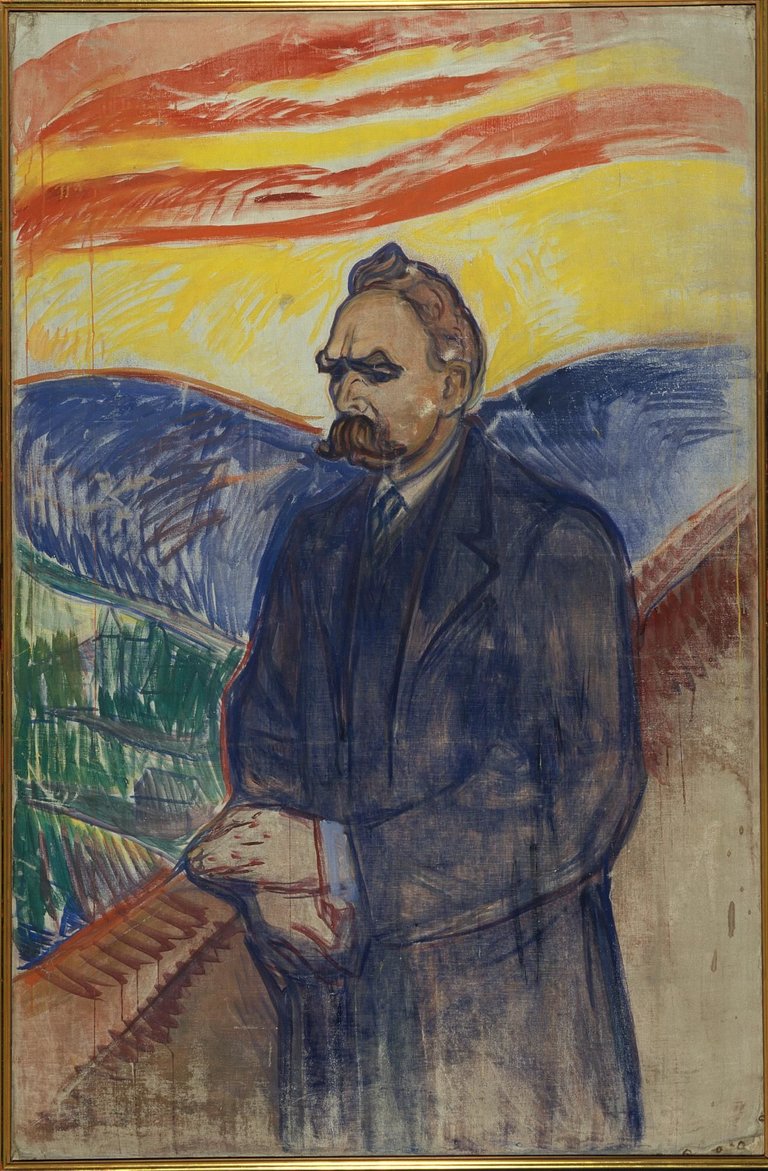
Credit: Nietzsche, by Edvard Munch. 1906, at the Munich Museum. Public domain.
Did you ever go down a rabbit hole in search of an idea, or an author? I just climbed out of one. This week I read (actually listened to) Nietzsche and the Nazis by Stephen Hicks, on Youtube. This book kept popping up on my search engine for a while and I ignored it (as many of my readers might be tempted to do). But, once I started listening to Professor Hicks, I couldn't stop.
Please note: Quotes from Nietzsche in this blog were taken from the audio book, and verified with other sources. The author, Stephen Hicks, reads the book in an engaging manner. It is presented on the CEE Video Channel
Nazis have been a popular point of reference for at least the last century. People are intrigued by how such a movement could have taken hold in a highly educated society such as Germany was in the early 20th century (and is today). Hicks offers us some insight into this conundrum as he examines the intellectual underpinning of the Nazi regime. That underpinning, he believes, may be found in the philosophy of Friedrich Nietzsche.
Dr. Hicks is not alone in making a connection between Nazis and Nietzsche. Charles M. Yablon, writing in the Cardozo Law Review, asserts that the Nazi (National Socialist German Workers' Party) regime extensively adopted Nietzsche's philosophy. Here is a relevant quote from Yablon's essay:
Nietzsche was...utilized by the Nazis as a source and justification for their ideology. Nietszchean concepts pervade Nazi propaganda, as well as the more academic work of Nazi philosophers.

Friedrich Nietzsche and His Mother
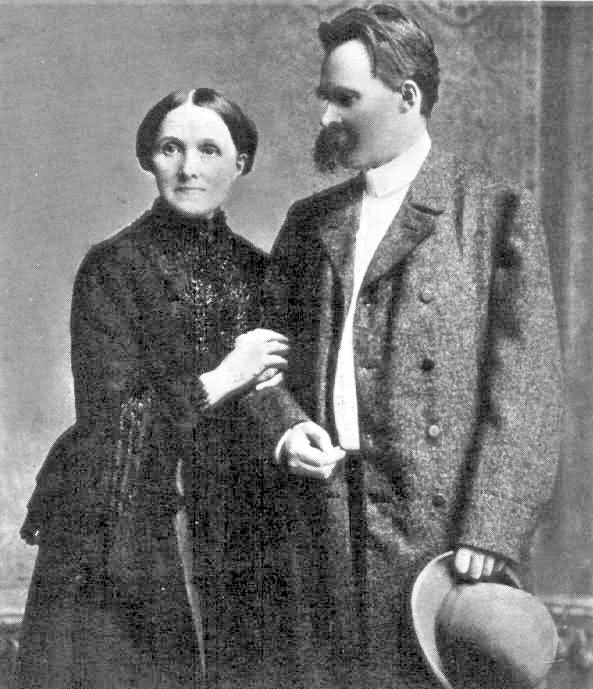
Credit: Original uploader was Sturm at pt.wikipedia. The picture was taken sometime in the mid 19th century. Public domain. In suggesting clues to a subject's complex personality, critics often point to the mother. According to the Paris Review, in Nietzsche's case this might be a productive area to pursue. When he was thirty-eight, Nietzsche wrote to a friend, "I don't like my mother".

The analysis of the Nazi/Nietzsche connection offered by Stephen Hicks is refreshing because the author does not overtly inject his opinions. However, it is worthwhile to point out that Hicks does have a particular perspective. He is a Senior Scholar at the Atlas Society, an organization dedicated to promoting the teachings of Ayn Rand. In reading more essays written by Hicks (yes, I did!) I noted that much of his analysis, even of other philosophers, considers the importance of the individual vs. society. This possibly reflects the emphasis on individual rights in Rand's philosophy.
On a website dedicated to the writings of Ayn Rand (The Ayn Rand Institute) one finds a description of her thoughts on individual rights/obligations:
At the foundation of a free society...is the metaphysical-epistemological principle that the individual survives by choosing to use his mind and the moral principle that the good is to pursue his self-interest and achieve his own happiness.
Given Rand's world view, which is called Objectivism, it is not surprising that much of Stephen Hicks' discussions focuses on the role of the individual in society. When it comes to Nietzsche and the Nazis, Hicks' conclusion is unambiguous: Both advocated for collectivism over individual rights.

Drawing of Nietzsche Near the End of His Life
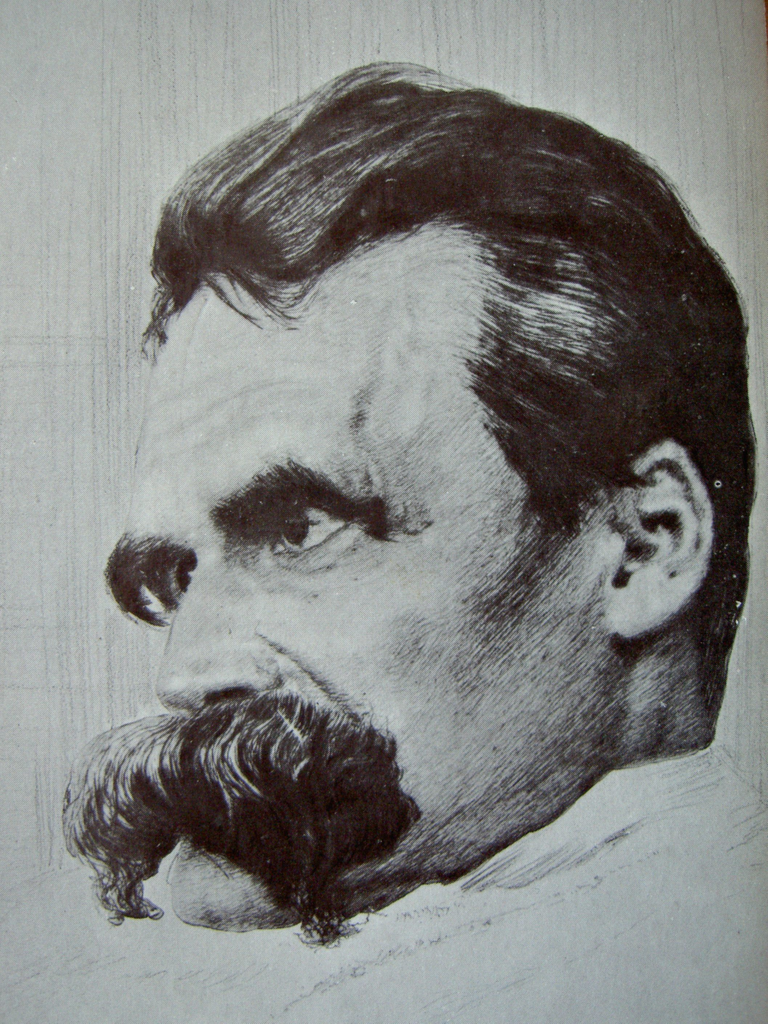
Credit: Hans Olde (1855-1917), 1899. Nietzsche had a complete mental breakdown when he was forty-four, and was suffering from dementia when this portrait was drawn. According to the Encyclopedia Britannica: "Nietzsche collapsed in the streets of Turin, Italy, in January 1889, having lost control of his mental faculties completely".

Hicks explains in his book that for Nietzsche, the individual, even the special individual (the so-called Übermensch), is not an end in itself. The individual's only value is to serve the greater good, the good of the group, of the species. It is the subordination of individual good to the group that Hicks sees as supporting the Nazi view of individuals not as ends in themselves, but as members of a group. This collectivist principle, in Hicks' view, helped the Nazis to formulate such horrific policies such as extermination and sterilization.
Hicks offers quotes from Nietzsche which express the philosopher's belief in the importance of group identification over individual rights. In Part 7 of Nietzsche and the Nazis, entitled, Nietzsche as a Proto-Nazi, Hicks offers quotes which demonstrate Nietzsche's 'biological' determinism:
One cannot erase from the soul of a human being what his ancestors like most to do and did most constantly....One does not choose or shape oneself significantly."
and
My philosophy aims at an ordering of rank: not at an individualistic morality
and
Mankind in the mass sacrificed to the prosperity of a single
stronger species of man—that would be an advance
Besides subordination of the individual to the group, there are other areas in which Nietzsche's philosophy supported Nazi policies (according to Hicks). Conflict is one of these. Hicks explains, that, for both Nietzsche and the Nazis, "conflict is the fundamental human reality...life is a matter of some individuals and groups gaining at the expense of others". Hicks asserts that because of the belief that conflict was essential, the Nazis could not live in harmony with other groups, such as Jews or liberal capitalist nations.
Hicks offers quotes from Nietzsche's writing that address the role of conflict in human interaction. Here are a few:
The well-being of the majority and the well-being of the few are opposite viewpoints of value
Hicks explains that for Nietzsche, conflict is a zero sum game with winners and losers. Two more quotes:
Life itself is essentially appropriation, injury, conquest of the strange and weak, suppression, severity, obtrusion of peculiar forms, incorporation, and at the least, putting it mildest, exploitation.
and
Life always exists at the expense of other life.
Hicks offers us another parallel between Nietzsche's philosophy and Nazi policy: the role of war in society. According to Hicks:
The Nazis committed fundamentally to war as their primary means of self regeneration and dominance over the rest of the world.
He compares this perspective to Nietzsche's statement about war and the cost it exacts in lives lost:
All too many live. Would that a storm come to shake this worm-eaten rot from the tree.
Also:
The beginnings of everything great on earth are soaked in blood thoroughly, and for a very long time.

Luminaries of Pantheism, Venice, CA
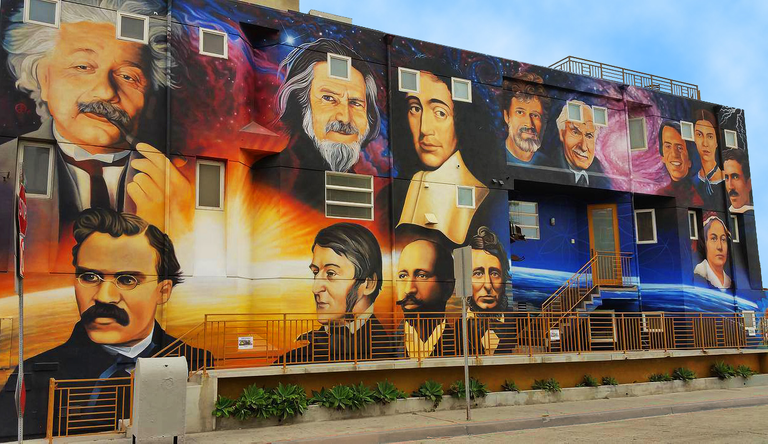
Credit:Levi Ponce. Used under CC International license 4.0 Nietzsche has a great following. His picture on the mural is on the second row, first place.

After finishing Nietzsche and the Nazis I decided to read other sources that deal with the connection between Nietzsche and Nazis. Many sources do not agree with Dr. Hicks. These sources believe that applying Nietzsche's philosophy to Nazi policy is misappropriation. For example, Scotty Hendricks writes of the Nazis, (on the 'Big Think' website):
They adored his ideas, and anointed him as the prophet of their ideology.
And most of it was due to misunderstandings and willful changes.
Also, in an essay on the Princeton University website, Jacob Golomb and Robert S. Wistrich place responsibility for Nazi appropriation of Nietzsche's ideas at the feet of his sister. When Nietzsche was physically incapacitated, his manuscripts were in his sister's care. She, the authors explain, saw in the writing justification for fascism. She, they explain, invited Hitler to view the material.
Elisabeth Förster, Nietzsche's Sister
Credit: a Mr. Hertel. 1894. Public domain
Conclusion
I find Hicks' discussion persuasive. I have limited familiarity with Nietzsche's work, but I don't see any way around some of his statements. Nietzsche has contempt for humans. He wrote that the more people who die, the better. Frankly, it seems to me that much of what he wrote was influenced by his mental illness. If he had been less talented, less brilliant, we probably would dismiss his writings as antisocial ravings.
As for Professor Hicks himself: He is amazing. Catch him on Youtube in any number of discussions. He is always in full command of the material. I have listened to several of his videos. Ayn Rand's philosophy is a turnoff for me, but that doesn't take away from Dr. Hicks' brilliance. He just happens to have a point of view that is different from mine.
Nietzsche and the Nazis is available in hardcover on Amazon, for $17.95. It is also available as a Kindle for $9.99.

Some Sources You Might Find Interesting
- Stephen Hicks, PhD, Philosopher
- The Neurological Illness of Nietzsche
- Post Modernism Explained by Dr. Hicks
- The Impact of National Socialism on the Philosophy of Nietzsche
Accent illustrations in the blog
Purple moon  LIL Gallery
LIL Gallery
Exotic Plant  LIL Gallery: @redheadpei from the : @muelli from the
LIL Gallery: @redheadpei from the : @muelli from the
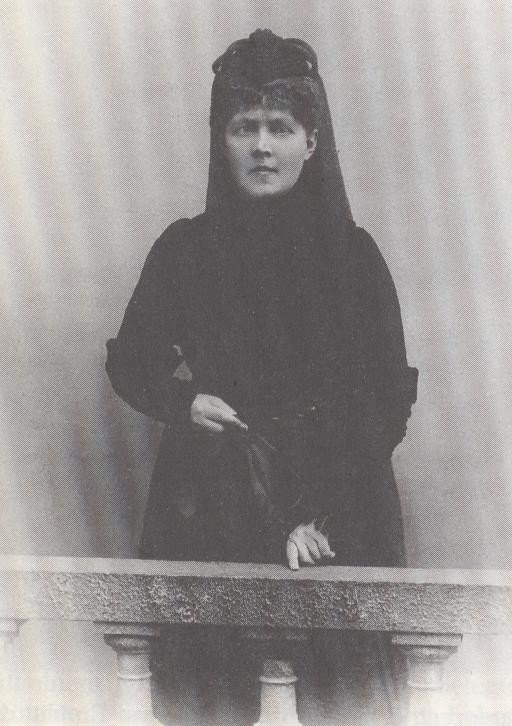
Nietzsche was a dope fiend! To treat his chronic migraines he used so many drugs that another philosopher said that Nietzsche's room looked like "a pharmacist's shop." This is THE KEY to his philosophy that saw beyond the dull dependable predictable robotic industrial human and into the singularity of cosmic consciousness. It was inevitable that the Nazis, with their emphasis on the thousand year Reich, would adopt the vegetable-derived wisdom of Nietzsche's pain-bliss insights.
😁
😂
Well, one thing is sure: his brain was addled. If you look at the medical source I list, the migraines are mentioned there. How can we diagnose someone 150 years after the event? Did he have syphilis? Was his illness congenital (his father died young of a mysterious brain illnes)? Could he have had had Huntington's? Was he drug addicted?
Nietzsche was out of his mind, that is certain.
As always, you entertain with your original take on the blog. Thanks for stopping by and reading.
Or maybe he was the one-eyed man in the kingdom of the blind. 🤔
I studied Nietzsche in philosophy class in college, and it's correct that it's his sister who twisted his writing when he was incapacitated with syphilis. Nietzsche himself abhorred what the Nazis stood for. If you want a quick intro to Nietzsche, there's a book in the series "Philosophers in 90 Minutes" that covers him; it's like Cliffs Notes for different philosophers. ;)
Thank you for that response. It's hard to think of a writer who has had a greater impact on several generations than Nietzsche has had. My inclination is to dismiss him with disdain, but, as one of my teachers (long, long ago) explained, he is a powerful philosopher. It would be arrogant of me to dismiss him.
How to get to the truth of the matter? If his sister and the Nazis did indeed edit his work, how do we know what he said? I'd have to look at any material that existed before others got to it. However, the individual, Nietzsche, doesn't matter so much as his writing matters. It is his writing, such as we have it, that holds power. It is his writing that we must judge. History and time will treat many of us unjustly. He is stuck with what we have, however that came to be.
I will read his own words, if I want to know more. I will read other scholars if I want to understand more. I'm pretty much a primary source person. So, I think I'll skip the 90 minute version 😆.
As for Nietzsche having syphilis: we really don't know. If you see the reference I offer, there are other explanations for his madness. Syphilis was certainly a scourge in that time. Maybe he had it. Maybe he didn't. Whatever the truth of that, he certainly was mad.
You got such a long answer. Sorry.....
I find it interesting that there is still a lingering sense of uncertainty over whether or not Nietzsche's works were the ideological underpinnings of the Nazi Party. The Nazis themselves rather overtly stated that he was. The concepts of "ubermensch" and "untermensch," in both name and substance, came straight from his concept of the "Super Man."
Asking if there is a connection between Nietzsche and the Nazis is a bit like asking if there could be a connection between Marx and the Bolsheviks.
Anyway, I do like your review. You make the book sound intriguing.
I agree😃.
Thanks for reading and for that kind assessment of my blog.
I’m no expert, and I had to Google it to remember his most famous line - God is dead and we killed him - which has nothing to do with the actual death of God, but has much to do with reliance on religious fantasy as an anti-affirmation of science.
Many people believe that his works were “edited” by his right-wing sister, so that they bear very little resemblance to what he actually wrote. She popularised his thoughts among the Nazi elite - or so I’ve heard.
Right-wing sister indeed. She actually started a colony in Paraguay--a pure 'Aryan' colony. Mental illness might have run in the family😅.Hello @itsostylish,
I've never wanted to invest the time in reading Nietzsche. Such an unpleasant world view. Seemed to me that a lot of people who were attracted to him were looking for something, were hoping to see some kind of resolution to their own sense of insecurity. (Maybe I"m being unfair) However, he has had a powerful influence on the world, so I guess we should try to understand why.
I appreciate that you stopped by and read this long blog😇Thank you!
My first impression was put a couple horns on Nietzsche in that first image and he would look like the devil himself. 👿
As always, An interesting post, A.G. @agmoore. I heard of Nietzche but never knew much about him. I wonder what he would remark about the population of the world now?
I think he coined the phrase, “ What doesn’t kill you makes you stronger.”
I’m pleased you used my moon from the lil gallery. 😊
We are having beautiful weather. I hope you are too. ☀️
😆
He was nasty, wasn't he? I think he would not be disappointed in the population of the world now. He would see it as meeting his expectations.
I don't think that did him a lot of good. Actually, I feel sorry for him. He suffered for so many years and it seems his caretaker (his sister) likely exploited him.
Your moon is wonderful. Doesn't it look great there? Thanks so much.
I'm glad the weather is treating you well. Holding my breath...things are beautiful here.
Thank you for reading and commenting on my long blog. Be well my friend, @redheadpei.
I can image his tart remark about our wasteful society and the toxic environment left by so many people.
Sounds like a lot. I did read a bit of history of Nietzsche one time. It was during my stay in the library at the seminary. Naturally, seminarys are for study of philosophy and theology so there was a lot of books on philosophy, Nietzsche, beyond good and evil, God is dead, etc. Albeit I always wanted to read them, but I never did. The little I read gave me an insight of how he (Nietzsche) was always misinterpreted. His mental illness was a turning point I think.
Greetings 😇,
The seminary: I'm impressed.
Somehow, I never wanted to read Nietzsche. Of course, in college we read bits. In graduate school some more bits. It's not the same as delving into something, is it?
I'm sure he would say I am afflicted with a slavish mentality because I don't rise above the ideals of selflessness on which I was nurtured. Sorry, I do think we are served as a species better by people who can both pursue their own self-interest and also act in the interest of others. Achieving a balance between these two world views is the challenge we all face as we go through life, I think.
The mental illness surely cut short his productive years and also I think affected what he did produce. But, as I explain in the piece, I'm not sufficiently conversant with Nietzsche's work to offer an opinion that carries any weight.
I appreciate that you read my blog and that you took the time to comment. Thank you very much.
Interesting subject, thanks for your input.
I have my 2 cents about it though. Nietzsche was indeed often mentioned in German circles at the time, particularly through the word Ubermensch; but this took on a different dimension when a certain Englishman got hold of it and changed the rules a bit.
As shown in one of your quotes, Nietzsche's Ubermensch most important characteristic is the quality of his soul. This is indeed where Nietzsche alludes to human inequality, a touchy subject for modern Western liberal society, but the Germans at the time took it in a very material, racial sense. And they got this idea mostly from Lothrop Stoddard, who wrote a book called 'The revolt against civilization; the menace of the Under-man'.
Under-man=Untermensch. Stoddard rolled with Nietzsche's definitions, but changed them along the way to strictly racial view, where white civilization should be preserved over the rise (in numbers) of the non-whites. Stoddard was no fan of Jews either.
Good review, hope to see you do more of this kind of stuf in the Book-review section.
Thanks for the reference to Lothrop Stoddard. New to me, although I have done a bit of reading on the eugenics movement in the U.S. Some very 'respectable', mainstream voices were active in it. As a matter of fact, no lesser voice than Justice Oliver Wendell Holmes gave it legitimacy in 1927 when he declared from the Supreme Court bench, "Three generations of imbeciles is enough" (Bell v Buck). With that judgement he gave his blessing to forced sterilization.
Stoddard, unfortunately, sounds very contemporary. I hear such sentiments expressed daily in public forums (in the U. S. ).
I appreciate that you read my blog and took the time to offer such a thoughtful answer. Hivebookclub is my kind of environment :) I love reading, history, research, ideas, etc. The next time an idea or book grabs my attention as this one did, I will post again.
Regards,
AG
Your post is now feautured on the Nietzsche and the Nazis the book page!